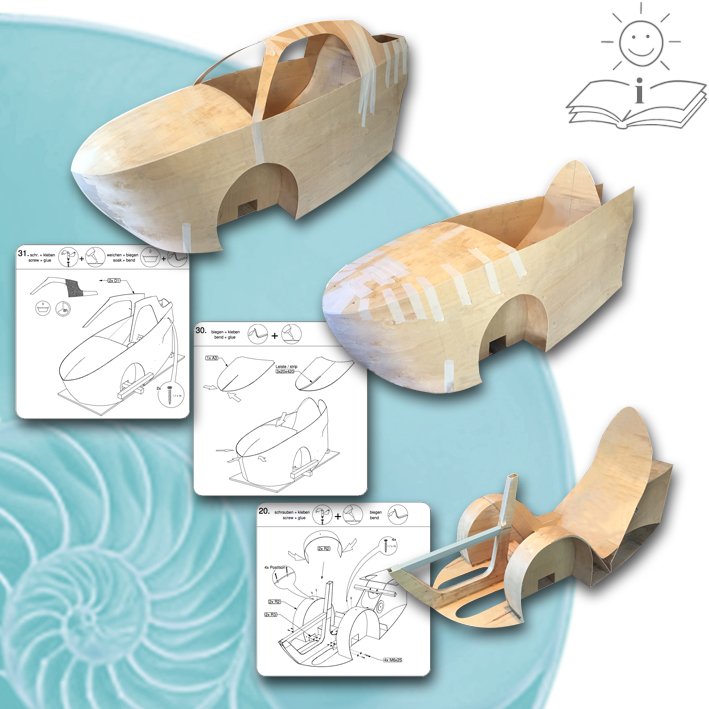Build and ride velomobiles successfully with our blueprints

You would like to work with wood and ride a velomobile? Here you have found the solution for both! Through your own contribution, you will receive a very affordable and high-quality velomobile.

You can using our blueprint, create a self-supporting body made of plywood with excellent properties.
Thanks to the imagery, the building instructions are internationally understandable.
Affiliated information is provided in english and german.

Easily transfer the 1:1 pattern in original size to the plywood panels using the pattern wheel.
The original scale 1:1 enables you to cut out the plywood parts with millimeter precision without dimension tables and conversion factors.
The cut-out parts can be put together precisely and quickly using the "screw and glue" method.

The target you can get there step by step with our detailed building instructions.
In the SUPPORT you can get the current construction information at any time. If you get stuck, you are welcome to write us an email or give us a call. We will help you in any case!
FAQ - frequently asked Questions
Is this DIY project suitable for me?
If you enjoy handcraft, if you have good technical knowledge and experience in working with wood, plastic and metal: Yes! You should also be familiar with the subjects of "velomobile" and "bicycle mechanics".
How much time do I need for the finished body?
This is very different and the development process also takes time. If you take it easy, you will have more joy and the result will be better. A period of 4 weeks for the finished body is realistic.
How high are the material costs for a finished agilo or ventec?
Material for the painted body including windows: ca. 600 €
Basic equipment with bicycle and velomobile components: ca. 1800 €
Electric assistance: ca. 1000 €
Isn't a wooden velomobile too heavy?
With light plywood, good workmanship and light components, a velomobile made of wood can definitely keep up with velomobiles made of carbon.
Which kind of plywood can i use?
The plywood must meet 3 conditions:
1. Panel format at least 1220 x 2500 mm
2. Material thickness 3 mm
3. Number of layers: 3
With a density of 350 - 410 kg / m3, poplar and ceiba are the lightweights among plywood, okume is approx. 20% heavier, but also correspondingly more stable. The strength of the different types of wood is quite exactly proportional to the density (20% more weight = 20% more strength). The same applies to the hardness of the material and thus its machinability. A mix of different types of plywood can be useful in order to combine the respective advantages.
Why plywood with 3mm thickness?
Because a large wall thickness has particular strengths: high rigidity, the surfaces is better, dampened vibration, better protection against heat and cold, better dimensional stability (dents, warpage, wobbling), better correction options (grinding), larger adhesive surfaces (transmission of forces).
Can I use plywood thickness other than 3mm?
no, because the construction is based on 3 mm plywood. With other material thicknesses, the parts would not fit together. Thicker material cannot be bent as required. Aside from flexibility, thinner material only has disadvantages (see above).
What do I need to build?
A room of around 12 square meters would be sufficient, something the size of a garage would be ideal. The tools you need: Jigsaw, cordless screwdriver, drill, pattern wheel, cutter, tape measure, angle, screw clamps, clamps, sanding block or hand grinder, sandpaper, precision saw, metal saw, flat file, paint roller, workbench, two trestles and a mounting plate approx. 2.20 mx 80 cm.
Which working steps are involved?
You have to: draw, cut, drill, grind, soak, bend, glue, filler, paint, assemble.
How do i build a velomobile?
Use the support!
